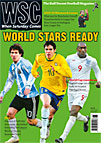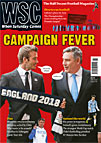 Dear WSC
Dear WSC
So, following Man Utd’s exit from the Champions League at the hands of Bayern Munich, Sir Alex Ferguson saw fit to make the following comment regarding players influencing a referee, in particular to getting an opponent dismissed: “They got him sent off – everyone ran towards the referee. Typical Germans”. I couldn’t help but think back to Derby v Man Utd at Pride Park in the late 1990s and an incident I witnessed just yards from where I was sitting. I distinctly remember Gary Neville instructing the referee, Mike Reed, to send off Derby’s German defender Stefan Schnoor for a foul he had committed shortly after having already received a yellow card. Reed had walked away and wasn’t going to take further action until United’s players forced him to change his mind. To double check my memory I found the following match report on the Independent’s website for the match on November 20, 1999: “Stefan Schnoor, admittedly, invited his own dismissal, ploughing through Dwight Yorke in the 40th minute after being cautioned for dissent moments earlier. What enraged Derby was that when it seemed Mike Reed was undecided about a second yellow card, and the automatic red, David Beckham and Gary Neville ran over in an apparent attempt to pressure the referee into banishing the defender". It’s a bit of an irony, isn’t it, Man Utd’s English players talking a referee into sending off a German. Perhaps, if this behaviour is “typically German” in 2010, they are just emulating the behaviour of English players in an English team, Manchester United, who have been practising it for over ten years.
Andy Kitchen, Derby
Search: 'Paul Ince'
Stories
 Events at the interval have chnaged greatly since the days of the police dog-handling display. Matthew Gooding highlights the tedious, the surreal and those for a good cause
Events at the interval have chnaged greatly since the days of the police dog-handling display. Matthew Gooding highlights the tedious, the surreal and those for a good cause
You expect to see certain things at football matches – grumpy old men, over-excited children, pies containing meat of dubious origin. But in all my years watching football I never expected to see Timmy Mallett taking penalties against a moose, using a pair of giant testicles, while a Sven-Göran Eriksson lookalike watched on. As anyone who was at the recent Blue Square Premier match between Cambridge Utd and Oxford Utd will tell you, it really happened, and it was glorious.
 Berlin has just lost its only top-flight club, but reaction to Hertha's relegation has been fairly muted. Paul Joyce explains
Berlin has just lost its only top-flight club, but reaction to Hertha's relegation has been fairly muted. Paul Joyce explains
In March 2009, Hertha BSC were top of the Bundesliga and went on to finish fourth. The Berlin club were relegated a year later, however, having been bottom of the table since September. For the first time since 1997, Germany’s capital will be without top-flight football next season.
 As the press pick apart Liverpool's fall from grace, Tottenham and Manchester City's Champions League 'play-off' sparks a punfest in Fleet Street
As the press pick apart Liverpool's fall from grace, Tottenham and Manchester City's Champions League 'play-off' sparks a punfest in Fleet Street
Liverpool began the season hoping to win a 19th League championship. They ended it with 19 defeats. Rafa Benítez guaranteed supporters a top-four finish, but the club dropped to seventh place in the league, went out of the FA Cup in the third round and faced the ignominy of being knocked out of two European competitions. To put it mildly, the 20th anniversary of their last Championship-winning season has not been their most memorable. Putting it mildly, however, is not one of the charms of British newspapers. If the facts were difficult reading for Benítez, he will have wanted to avoid the back pages.
 No other World Cup hosts have been knocked out in such extreme circumstances as Switzerland in 1954. Paul Joyce looks back at the tournament's highest-scoring match
No other World Cup hosts have been knocked out in such extreme circumstances as Switzerland in 1954. Paul Joyce looks back at the tournament's highest-scoring match
The 1954 World Cup is mainly remembered for West Germany’s 3-2 victory over favourites Hungary in the final. But the quarter-final between Switzerland and Austria, the so-called Hitzeschlacht von Lausanne (Heat Battle of Lausanne), is if anything even more noteworthy. Not only was it played in intolerable weather conditions but it remains the highest-scoring game in World Cup finals history.